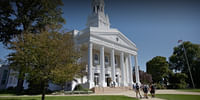Study Abroad
Picture of BoyStudents are encouraged to spend at least one semester in Russia. There are several approved summer and one-semester Russian language programs in Moscow, St. Petersburg, and cities in Siberia that are open to all students who have taken the equivalent of two or three years of Russian. Other programs should be discussed with the Russian Department. Students returning from study abroad will be expected to take two courses in the department unless exceptions are granted by the chair. Two of the four semester credits from a one-semester study abroad program may be counted toward the major; four credits may be counted from a year-long program.
Department Learning Goals
- Students are able to understand the main ideas in one-on-one and group communication, including conversations, interviews, and lectures on familiar topics.
- Students are able to speak clearly in most social situations, narrate and describe events, communicate facts, ask questions, and speak about topics of public and personal interest.
- Students are able to read with understanding and follow the essential points in most texts on familiar topics. They can comprehend texts from diverse genres in order to make appropriate inferences and to recognize different uses of language and styles.
- Students are able to write about a variety of topics with sufficient precision.
- Students display grammatical accuracy in their speaking and writing and familiarity with higher-level language competencies such as a sense for stylistic register.
- Students have a general knowledge of Russian literary history and literary genres and are familiar with some of the major Russian writers of the nineteenth and twentieth centuries. They have developed the tools for effective analysis and close reading of literary texts in Russian and in translation.
- Students have a basic knowledge of Russian culture, as well as history and politics depending on their course selection.
- Students have achieved a sufficient level of cultural competency to be able to interact in appropriate ways in contemporary Russian society.
- Students are able to appreciate the diversity and complexity of human thought and experience embodied by the similarities and differences between Russophone and Anglophone cultures.









